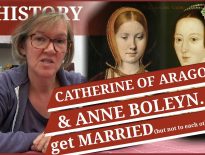On this day in Tudor history, 15th November 1532, a rather cross Pope Clement VII threatened King Henry VIII and Anne Boleyn with excommunication.
Why? Well, because Henry VIII had defied the pope's instructions and previous threats, and gone his own way, setting aside Catherine of Aragon and living with Anne Boleyn. The pope was not impressed with this disobedient king.
In today's talk,I share excerpts of the pope's letter, along with an explanation of the context and what happened next.
You can see more examples of the pope getting exasperated with Henry in the following videos:
March 7 - The Pope threatens Henry VIII - https://youtu.be/Y-N3cSyx4dA
January 5 - Pope Clement VII and Henry VIII - https://youtu.be/culFjoE6dWw
July 11 - The Pope's had enough of Henry VIII! - https://youtu.be/WepPlD4RW60
Also on this day in history:
- 1527 – Death of Katherine, Countess of Devon (also known as Katherine of York) at Tiverton Castle, She was aged forty-nine. She was buried at St Peter's Church, Tiverton, in funeral ceremonies on 2nd and 3rd December. Katherine had taken a vow of chastity after the death of her husband William Courtenay, Earl of Devon, in 1511. Katherine was the sixth daughter and ninth child of King Edward IV and Elizabeth Woodville. Her sister, Elizabeth of York, had married Henry VII, so Katherine was aunt to Henry VIII.
- 1555 – Death of Robert Holgate, former Bishop of Llandaff and then Archbishop of York, in London. He was buried at St Sepulchre. Holgate was imprisoned for a time during the reign of Mary I for being married, but was released when he renounced his marriage in his “Apology”.
- 1592 – Burial of Sir Thomas Cokayne, soldier, huntsman and author of “A Short Treatise of Hunting” (1591), at Ashbourne church in Derbyshire. Cokayne attended Mary, Queen of Scots on her journey to Fotheringhay in 1587, and helped found Ashbourne Grammar School.
- 1597 – Death of Robert Bowes, member of Parliament and Elizabeth I's English Ambassador in Scotland, at Berwick. He was buried at Berwick on the 16th November.
Transcript:
On this day in Tudor history, 15th November 1532, a rather cross Pope Clement VII threatened King Henry VIII and Anne Boleyn with excommunication.
Over a year earlier, on 5th January 1531, the pope had written to the king forbidding him to remarry, and threatening him with excommunication if he took matters into his own hands and disobeyed Rome. Since then, the king had continued his quest for an annulment of his marriage to Catherine of Aragon and had just arrived back from a trip to Calais to seek King Francis I of France’s support for his relationship with Anne Boleyn. And, if Edward Hall is to be believed, Henry had even married Anne the day before Pope Clement wrote this letter.
In his letter to the king, Pope Clement VII wrote how of how he was “grieved to see that the King, who has always hitherto been a pious son to the Pope and Holy See, has changed his conduct for the last two years without reasonable cause, though the Pope has not altered his affection for him.” He wrote of how he was sorry that “his office and justice” had compelled him to do anything that would displeased the king, whom he always tried to please, but asked if he was to “neglect justice and the salvation of the King's soul, or prefer their private affection to public interests and the Divine will?” He explained how he was was bound to do what was just and honorable, rather tha what would please the king at the moment, and went on to say that he “Trusts that when this cloud of error has passed from him, his former attachment will return, and he will confess that his Holiness could do nothing but what he has done, and has sometimes been over-indulgent.”
The pope went on to remind the English king that he, the pope, had committed the case of the king’s marriage to two legates four years previously, at Henry’s request, even though the pope thought the matter unjust, but that Queen Catherine’s appeal then “caused him to commit it, not to the dominions of the Queen's nephew, or other places where she might be favored, but to Rome, the auditory of the Rota, to be referred to himself and the college of Cardinals.” In the meantime, wrote the exasperated pope, instead of waiting for a decision from Rome, the king had taken it upon himself to leave Catherine and to publicly co-habit “with a certain Anne”.
The pope described this behaviour as “an injury to Divine justice” and cited a letter that he had written about this on 25th January 1532, and wrote of how grieved he was to hear that the king had ignored the pope and was still separated from Catherine and living with Anne. He then got serious, saying that he “Again exhorts him and warns him, on pain of excommunication, to take Katharine back as his Queen, and reject Anne, within one month from the presentation of this letter, until the papal sentence be given. If the King does not do this, the Pope declares both him and Anne to be excommunicated at the expiry of the said term, and forbids him to divorce himself from Katharine by his own authority, and marry Anne or any other, such marriage being invalid.”
Of course, Henry VIII completely ignored the pope’s warning and began co-habiting properly with Anne on his return to London on 24th November 1532. The couple married in an official, but secret ceremony on 25th January 1533, Anne being pregnant by that time. In May 1533, Archbishop Thomas Cranmer declared that Henry and Catherine’s marriage was null and void and that Henry’s marriage to Anne was valid, and Anne was crowned queen on 1st June 1533. The pope, however, on 11th July 1533, declared that Henry VIII’s marriage to Anne Boleyn was null and void, as was the annulment declared by Archbishop Thomas Cranmer, and he restored Catherine of Aragon to her “royal state”. He ordered the king to return to Catherine, threatening him once again with excommunication if he didn’t. Of course, Henry took absolutely no notice, but he escaped excommunication until 17th December 1538 when Pope Paul III excommunicated him following his break with Rome, his persecution of those who did not accept his supremacy, the dissolution of the monasteries and Henry’s desecration of religious shrines including that of Thomas Becket.
'Henry VIII: November 1532, 1-15', in Letters and Papers, Foreign and Domestic, Henry VIII, Volume 5, 1531-1532, ed. James Gairdner (London, 1880), pp. 637-650. British History Online http://www.british-history.ac.uk/letters-papers-hen8/vol5/pp637-650 [accessed 15 November 2019].



Leave a Reply